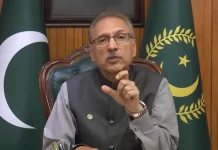
ISLAMABAD, Jan 15 (APP):National Security Adviser (NSA) Dr Moeed Yusuf on Saturday said India made a publicity stunt by announcing 50,000 tonnes of wheat assistance for Afghanistan and sent not a single grain for the Afghans facing worst humanitarian crisis.
The NSA in an interview to a private news channel said that India deliberately announced the wheat assistance intended to be transported through Pakistan’s land routes with the assumption that the latter would deny whereas it occured other way around.
Dr Moeed said India was committing crime against humanity and crossing all limits of genocide but the world has shut its eyes on it’s brutal atrocities.
“The global community is perceiving India as a counter weight to China but it has become a counter weight to itself,” the NSA regretted.
The resolution of Afghanistan’s crisis was upto the US administration as without relieving sanctions normalcy could not be revived to ensure a progressing Afghanistan, he said.
He urged that the world community should give assistance to Afghans to run their system smoothly for a peaceful country.
The NSA warned that there were four million Afghan refugees already in Pakistan and any unrest in Afghanistan would lead to massive spillover into Pakistan.
“The world and local media has been accusing me of being Taliban’s spokesperson but it’s my responsibility to protect my county and raise concerns over looming threats.”
He alluded that if there was a fire breaking out in his neighborhood then it would definitely effect him.
“Therefore, he is repeatedly flagging the humanitarian crisis going on in Afghanistan as it will have serious impacts on Pakistan.”
To a question, he said there was nothing like accepting governments rather states were recognised, adding, “Afghanistan is a recognised state ” “Banking system is choked in Afghanistan which should be revived so that local masses and international donor agencies should help common masses in Afghanistan.
We cannot do anything except convincing the world to support Afghanistan.” He informed that there was very positive response on government level between Pakistan and Afghanistan on border fencing and management but local level issues should be ignored.
Dr Moeed while commenting on the newly approved first-ever National Security Policy (NSP) said the policy had clearly mentioned economic security would be at it’s core.
“We have financial insolvency and our fluctuating GDP growth is compromising our sovereignty that needs to be fixed,” he added.
He said the mitigation of external imbalance and export diversification were imperative to be addressed as economic independence was necessary.
Dr Moeed mentioned that the implementation framework was important as NSP was the only policy that has a completed department of National Security Division for it’s implementation.
Commenting on the NSP’s direction set for national security of the country, he said this region could not proceed without Pakistan, adding, “Pakistan has envisioned an impartial policy to avoid any camp politics whereas it’s ties with China are non-negotiable and so for the US as it cannot afford to soar its relations.”
“Pakistan’s statement of intent is very necessary and we have to tell the world the reality about us. India by false narratives or crook has always tried to humiliate Pakistan internationally.”
He added that Pakistan had a clear direction in the NSP as it wanted peace and connectivity with India but it could not be done without resolving Kashmir issue.
Dr Moeed underlined that the NSP’s focus was to protect citizens of the country from TTP and other enemy country elements.
A slight uptick came in terrorism in border areas but was contained after successful interventions of the security forces and it should be clear there would be no compromise on the masses’ security, he added.
Expressing his views over China Pakistan Economic Corridor (CPEC), he said CPEC was the lifeline and future of the country.
The development work has been expedited and the next phase of industrialisation would bring economic prosperity in the region, he added.
“There is no other source of US$40-50 billion into the national economy other than CPEC,” he concluded.